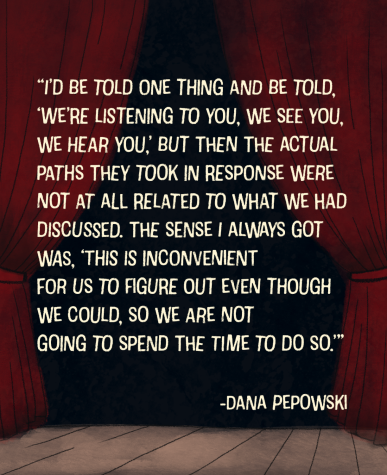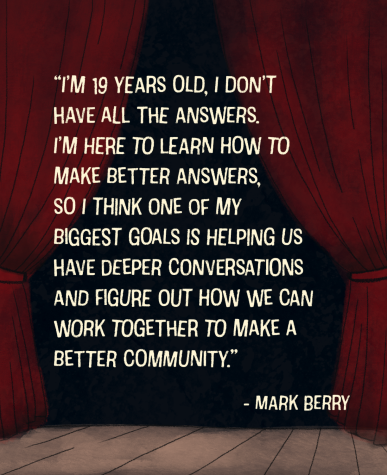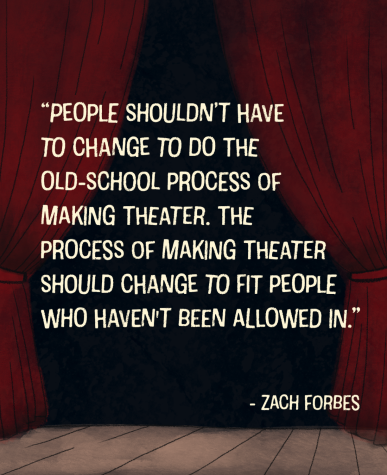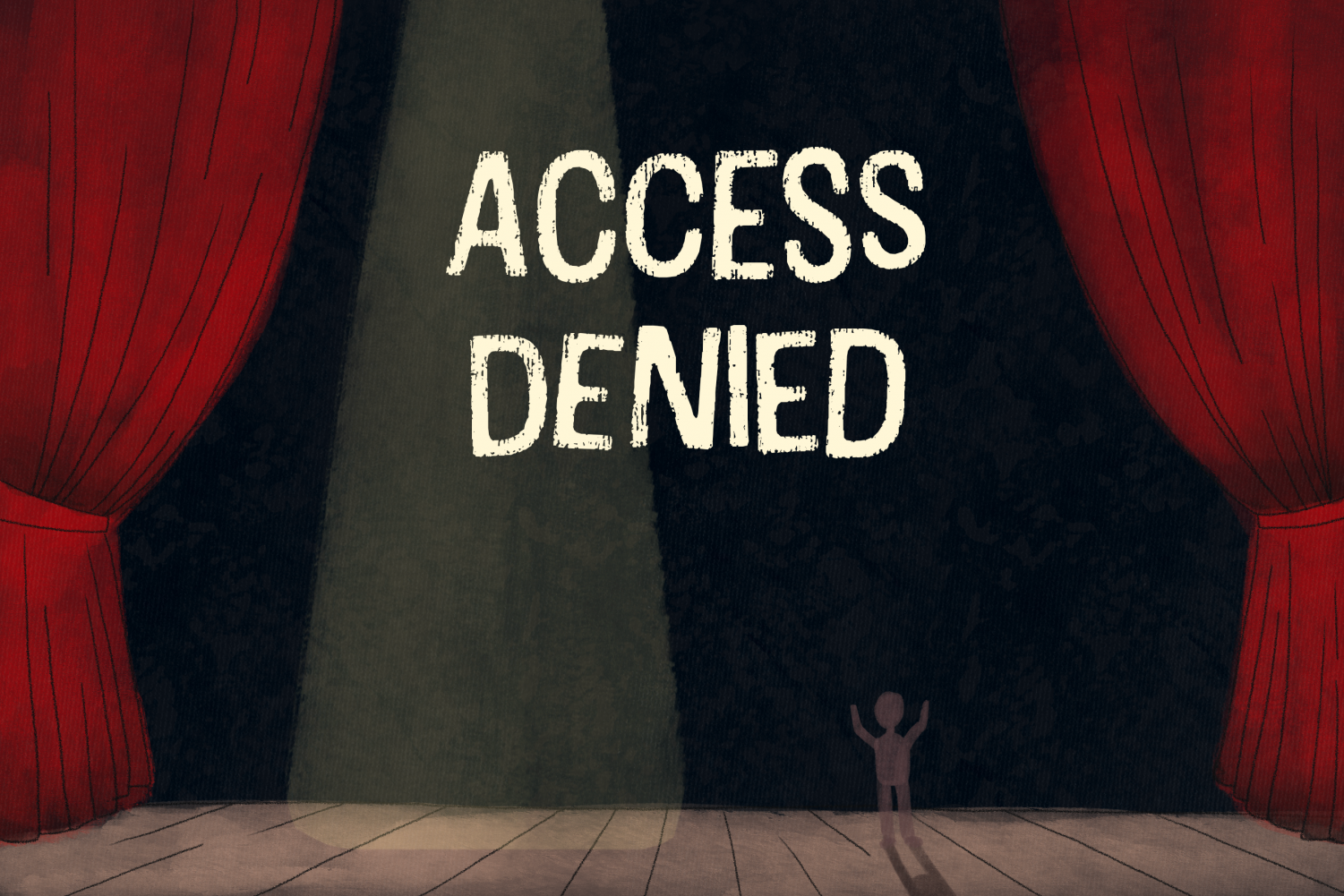In Focus: Northwestern theater students receiving accommodations struggle to find accessibility within theater program
July 12, 2021
In the fall of 2019, then-senior Dana Pepowski (Communication ’20) sought help from AccessibleNU after symptoms of her chronic illnesses began to worsen.
The accessibility counselor she worked with was the first person at Northwestern, and in her life, to ever validate her accessibility needs and illnesses, which are not obviously detectable.
Pepowski said she had very little success in receiving accommodations from school leadership. She has numerous chronic illnesses — including gastroparesis, colonic dysmotility and Ehlers-Danlos syndrome — all of which can cause physical pain or fatigue, impacting her daily functions.
Pepowski said she would often wake up in the morning with chronic pain. Some nights, she wouldn’t sleep at all due to the pain. She said she needed flexibility to miss class or rehearsals when the pain reached an unbearable level.
“For a long time, I would cry going to sleep because I would be like, ‘There’s no way I can ever have a career in this, because there will be weeks where I won’t really sleep,’” Pepowski said.
However, accommodations don’t always meet a student’s complete needs, which makes it more difficult for students to find an accessible place in NU theater. This issue also isn’t exclusive to the University — theater as a whole is not an accommodating industry.
For someone with disabilities, it can be challenging to participate in theater productions, which typically require an abundance of movement with no ramps or other such accommodations. Other aspects of productions, including lengthy rehearsal times and intense sensory elements, can also serve as barriers to participation.
Though one in four adults in the U.S. have some form of disability, accessibility is not yet institutionalized. Disabilities can be both physical and mental, but the accommodations ANU provides, like testing changes, note-taking, assistive technology and priority registration, focus more on traditional classroom needs. For theater students, however, this may not be enough.
Institutional interference
Throughout her time at NU, Pepowski said she received conflicting feedback from administrators, which left her feeling alone and confused without the accommodations she truly needed.
 Pepowski originally began her education in the Bienen School of Music, but transferred to the School of Communication after her sophomore year. She said she tried to get Bienen credits transferred so she didn’t have to take five classes in a particular quarter while her symptoms were flaring up. Despite ANU’s attempts at advocacy, the school was unreceptive.
Pepowski originally began her education in the Bienen School of Music, but transferred to the School of Communication after her sophomore year. She said she tried to get Bienen credits transferred so she didn’t have to take five classes in a particular quarter while her symptoms were flaring up. Despite ANU’s attempts at advocacy, the school was unreceptive.
Pepowski said her experience made her feel ANU didn’t have much power in swaying professors or administrators, leaving her to deal with the problem herself.
“I’d be told one thing and be told, ‘We’re listening to you, we see you, we hear you,’ but then the actual paths they took in response were not at all related to what we had discussed,” Pepowski said. “The sense I always got was, ‘This is inconvenient for us to figure out even though we could, so we are not going to spend the time to do so.’”
ANU and the School of Communication did not respond to requests for comment.
Communication junior Zach Forbes, who receives accommodations for a neurological condition that causes complex migraines, said he has had issues with obtaining aid from professors.
Forbes said he sometimes wakes up in the morning with a severe migraine, which can affect his eyesight, give him muscular pain or temporarily inhibit his movement. Despite his condition, professors would still mark him absent on days he had to miss class, negatively impacting his participation grade.
In a field like theater, where every member of the cast and crew ideally needs to be present for the show to go on, Forbes said absences are harder to excuse. But for students with chronic pain, they are a necessity.
“Some professors don’t think of students with accommodations in the classroom unless it’s brought up,” Forbes said. “It can make things awkward because I want to bring up that I don’t think I can do this or should do this, but that would change the whole structure of everything and would out me in front of everybody.”
Forbes said students who need accommodations must constantly advocate for themselves, putting them in an uncomfortable position as they don’t want to inconvenience professors, directors and peers.
If professors and directors were more proactive and planned for students’ accommodations, he said it would alleviate some of the students’ burdens.
Similarly, Pepowski said professors must be more flexible, rather than assuming everybody has the same physical and mental capabilities.
“If (professors and directors) listen to students and what they’re asking for, there’s your answer,” Pepowski said. “Your students are smart and know what they need.”
“Not just a ramp”
In Pepowski’s experience at NU, accessibility often has a narrow definition in people’s minds, like a ramp or an elevator. But she said these accommodations scarcely scratch the surface of what they need to be.
Accessibility has yet to become a full-fledged conversation within theater boards, according to Mark Berry, a co-chair of Northwestern Student Theatre Coalition, which represents 12 student-run theater groups on campus.
“Often people assume just because someone looks healthy and like they’re functioning well in a rehearsal space, that they are healthy,” Pepowski said. “I’ve always felt supported, but it was sometimes scary and tiring to advocate for what I needed because I didn’t want to be seen as an actor who was hard to work with.”
Pepowski added that the problem isn’t necessarily students’ responsibility to solve. She said NU should be teaching students how to have these conversations and supporting them by building inclusive spaces for actors and crew members.
Some individual boards in StuCo have their own accessibility chairs, such as Purple Crayon Players, who focus on creating a safe environment within their group. The majority of StuCo’s accommodations, however, arise from student initiatives rather than university support, Berry said.
StuCo’s current board, led by Berry, a Communication junior, and Communication and McCormick senior Gillian Finnegan, is prioritizing the creation of a supportive environment and encouraging students to ask for resources and accomodations, the pair said.
“It would be nice if every single person could come to every single rehearsal and do every crazy, dream thing we want to be on a  stage,” Finnegan said. “But just being a lot more realistic with what people can and are comfortable with doing is a priority.”
stage,” Finnegan said. “But just being a lot more realistic with what people can and are comfortable with doing is a priority.”
The organization has Accessibility, Inclusion and Diversity chairs who field accommodation requests and aim to ensure StuCo is diverse and inclusive by hosting town halls and affinity spaces for people of color.
However, Berry said the role needs to incorporate more accessibility work. They said they hope AID chairs will be able to provide more outlets for StuCo members to work through mental health concerns going forward.
“I’m 19 years old, I don’t have all the answers,” Berry said. “I’m here to learn how to make better answers, so I think one of my biggest goals is helping us have deeper conversations and figure out how we can work together to make a better community.”
Student-run versus professional theater
Both Pepowski and Forbes said, in their experiences, StuCo has been much more accommodating and welcoming than the Wirtz Center for the Performing Arts, NU’s professionally run theater.
This, Pepowski said, is largely because Wirtz is composed of professors and other non-undergraduates rather than her peers. As a result, she felt she couldn’t disclose her accessibility needs because she couldn’t be seen as the “weak link.”
Since StuCo is student-run, Forbes said members understand the difficulties undergraduates encounter and are more accommodating than professional theaters, like Wirtz. Forbes said he has noticed that the professional directors Wirtz brings in — which occurs for about one in four productions — are the least accommodating and most removed from students.
He added that it seems that student groups like StuCo make more of an effort to be accommodating. Even though it sometimes falls short, the coalition is still trying to improve student support.
“Student theater is at least trying more than professional theater and the University, and they don’t have a lot of resources compared to Wirtz and Northwestern,” Forbes said. “If Northwestern and Wirtz wanted to set an example and make an active effort to do this they could, but they don’t.”
Finnegan said StuCo has examined its practices as theater has undergone a reckoning in terms of racism and inaccessibility this past year. Berry said this was largely inspired by the national movement, but it is also an issue StuCo has been aware of for a while.
“StuCo wants to right the wrongs in the industry and try to make theater that looks like an industry that we want to go into instead of upholding inaccessible practices,” Finnegan said. “Not everybody at Wirtz really gets that as much.”
While Wirtz is a commercial theater that relies on profits from ticket sales, StuCo is funded by Associated Student Government. Berry said this means there is less of a focus on profits, which allows the organization to prioritize students’ well-being.
Al Heartley, managing director at Wirtz, said the performance center is committed to accessibility but needs to further publicize its efforts.
He said students often don’t know where to receive accommodations at Wirtz and who to contact.
“We do need to improve how we communicate to students to be able to bring those concerns to us so we can meet those needs,” Heartley said. “The goal is to absolutely be attentive, to listen and to figure out how we go into action in order to make sure it is successful for everybody.”
Issues from the start
Many accessibility issues in theater start at the beginning of the production process: auditions.
The typical audition process for StuCo consists of two prepared monologues and songs. Joining the executive board and auditioning, Berry said, both involve prior knowledge that many non-theater majors may not have. The process for joining a StuCo board involves petitioning through a Google Form and a 15-minute interview with the organization’s leaders.
This can be especially inaccessible for people with disabilities who may not be able to partake in late-night meetings. Additionally, those who have social anxiety or other mental illnesses may find that an interview is not the most effective way to showcase their ability or highlight their personality, Berry said.
StuCo, which has a notoriously rigorous petition process, is aiming to reform how auditions will look going forward, Berry said. They said if a student is entering the University as a theater major, their peer advisor will typically get them involved with TWIST, StuCo’s weekly newsletter, very quickly.
Berry said moving forward, the organization plans to provide more resources for students with mental illnesses and open feedback forms to get student input.
In StuCo, accessibility considerations have also varied significantly between mental and physical disabilities. Berry said within StuCo, mental health has been a large point of focus in the last 15 months due to the pandemic, but physical needs have been vastly overlooked.
While this may be a result of a lack of in-person activities, Berry said they hope more attention will shift toward people who may be hard of hearing or have visual impairments this fall.
Wirtz is also working to approach accessibility in the audition process differently. Heartley said Wirtz is not “under the assumption of ability” and is encouraging community members at all levels to consider the ways their roles interact with accessibility.
“It really is about collaborating to say what works best for the student and performer and how we can adjust our practices — whether it is rehearsal schedule or expectations on when to hit certain pieces,” Heartley said.
A (mostly) good example
The University of Illinois Urbana-Champaign has received some praise for its support of students with disabilities. The university has been a pioneer in championing accessibility, including being the first university to install curb cuts and have a study abroad program tailored to the needs of students with disabilities.
Gabriel Solis, the head of the theater department at UIUC, said the majority of the department’s capacity to accommodate students with disabilities stems from university support to be as accessible as possible.
To address the needs of students who are mentally or emotionally affected by their theater classes or productions, UIUC hired a counselor who is focused on supporting theater students, paying particular attention to performance anxiety. This step, Solis said, is just part of UIUC’s prioritization of equitable access to theater, which he describes as an “ethical responsibility” to the UIUC community.
Furthermore, theater tells the story of human experiences, Solis said. If not all experiences are represented and included, the story isn’t as accurate as it could be.
“We are not meeting our responsibility and our opportunity as a theater department in a research university if we are not striving to find ways to help students tell as many kinds of stories about the human condition as they can,” Solis said.
Despite these steps toward disability awareness and inclusion, Solis said UIUC still has a long way to go in achieving full accessibility. At many theater institutions, support for accessibility exists, but the underlying issue remains the same: a lack of financial support.
 Accessibility is often an expensive feat. The infrastructure requires labor and staff, hiring therapists can be a long process, but schools need to start making these investments, Solis said.
Accessibility is often an expensive feat. The infrastructure requires labor and staff, hiring therapists can be a long process, but schools need to start making these investments, Solis said.
“It’s not strictly about disability, but it’s certainly about making theater accessible to all so that hopefully every student who wants to can thrive in it,” he said.
A more accessible future
The way theater has historically functioned has posed barriers for people with disabilities. Forbes said the industry’s culture is exclusionary at many levels, and until that is resolved, moving forward will be difficult.
“People shouldn’t have to change to do the old-school process of making theater,” Forbes said. “The process of making theater should change to fit people who haven’t been allowed in.”
While incorporating more accommodations may not be an easy process, Solis said it should not be viewed as a burden. Instead, accessibility should be prioritized and interwoven into the production process.
At the beginning of his career, Solis said he was unsure of how to help students that came to him with accommodations. But now, he proactively prepares to support these students. The industry needs to move toward this mindset, Solis said.
“The process is about normalizing these things,” he said. “It’s about doing it not as an add-on, but as a part of the regular process.”
Though Pepowski graduated from NU a year ago, she said she is excited to see what accessibility will look like in the theater community at her alma mater moving forward. For current students, immediate change is crucial.
“Theater is the study of how bodies work and interact with one another, and to act like everybody’s bodies function in the exact same way and in the same amount of faculties is to lose a lot of nuances,” Pepowski said. “It’s interesting theatrically: why would we pretend that doesn’t exist when disabled people have existed the entirety of history?”
Email: [email protected]
Twitter: @rebecca_aizin
Related stories:
— Waa-Mu to feature performance with open captioning in effort to increase accessibility

